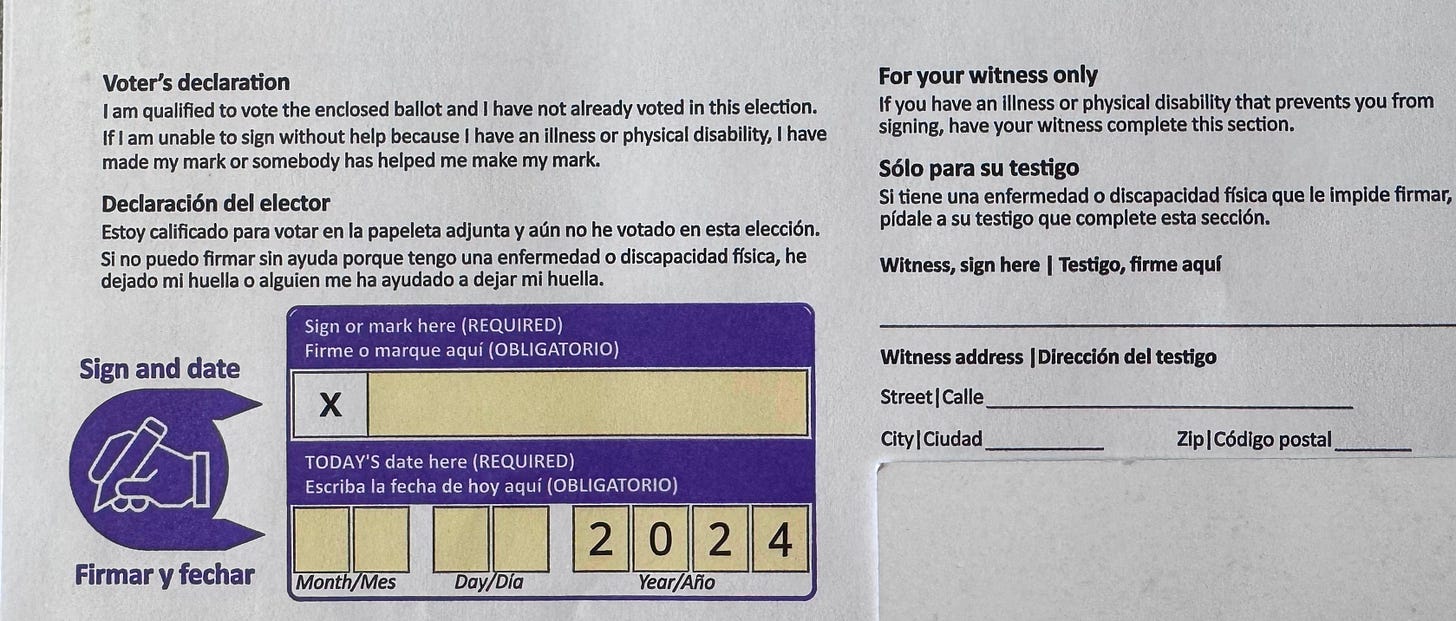
A federal judge decided this week that undated or incorrectly dated mail-in ballots should be counted in Pennsylvania.
Such ballots will be counted in the May 20 primary unless an appeals court intervenes before then.
In her decision, Western Pennsylvania U.S. District Court Judge Susan Baxter said “enforcement of the date provisions does not pass constitutional muster.”
Baxter’s Monday decision was applauded by the Pennsylvania Department of State, which oversees elections.
The “federal court decision is a victory for Pennsylvania's voters,” the department said in a statement. “A voter's fundamental right to vote should not be burdened by a meaningless technicality. County elections officials already confirm every ballot was sent and received within the legal voting window.”
The statement continued, “Although the responsibility of canvassing ballots is delegated to the 67 counties, the court made clear that refusing to count ballots because of the dating requirement violates the Constitutional rights of Pennsylvania's voters. The Department will instruct counties that all qualifying ballots are to be counted in future elections, including the 2025 Primary, unless a court rules otherwise.”
The statement said state election officials “are reviewing the decision and will work to ensure county elections officials understand and follow current elections laws.”
Lawyers for the Republican National Committee, which intervened in the lawsuit on behalf of defendants, did not respond to emails asking whether they intend to appeal. Democracy Docket reported Wednesday night on Blue Sky that the case is being appealed.
Meanwhile, the state Supreme Court is hearing arguments about another case involving whether improperly dated mail ballots should be counted.
Since Pennsylvania’s Act 77 allowed voting by mail starting in 2020, the law’s requirement that envelopes containing ballots be dated has been litigated at least a half-dozen times in county, state and federal courts, with decisions allowing or rejecting such ballots. Last November, ballots with no dates were not counted but they had been accepted in other elections. Thousands of ballots in an election are typically disqualified for improper dates.
The most recent decision before this week, in March 2023, by a three-judge panel from the U.S. Third Circuit of Appeals, said improperly or undated mail ballots should be rejected because they failed to comply with the requirement that outer envelopes be dated. The 2-1 decision reversed an earlier ruling by Baxter, who said undated ballots should be counted.
In that case (NAACP v. Schmidt), the appeals court rejected Baxter’s reasoning in support of voting rights groups that argued rejecting undated mail-in ballots violated what’s known as the “materiality provision” of the Civil Rights Act, which states that no one should be denied the right to vote because of a paperwork error.
GOP appeals federal judge's ruling invalidating date requirement on mail-in ballots
U.S. appeals court: Don’t count undated Pennsylvania mail ballots
The appellate court’s 2023 opinion agreed with voting rights groups that the date requirement "serves little apparent purpose," but added “that the Materiality Provision only applies when the State is determining who may vote. In other words, its role stops at the door of the voting place.”
In the recent case (Eakin v. Adams County), filed Nov. 7, 2022, by several voters against the state’s 67 county election boards, Baxter was presented with an additional argument – rejecting undated ballots violated citizens’ First Amendment right to free speech by infringing upon their right to vote.
The RNC countered that the issue revolves around the right to vote. Someone who shows up on the wrong day cannot vote; similarly someone who fails to date the envelope forfeits their right to vote.
Judge Baxter, who was appointed to the court by President Trump during his first term, pointed out the differences between the two approaches in her Monday opinion.
“The Court of Appeals’ decision in [NAACP v. Schmidt] did not, however, resolve the constitutional claim alleged herein. Specifically, Plaintiffs maintain that the county boards’ enforcement of the dating provisions violates the First Amendment by imposing impermissible burdens on Pennsylvanians’ fundamental right to vote — burdens that are not justified by any state interest,” Baxter wrote in her opinion. “It is well established that Voting implicates First Amendment rights.”
The Department of State, in its statement, said, “The Shapiro Administration has fought to protect every eligible voter and ensure that our elections remain free, fair, safe, and secure. The court got it right when it highlighted what Secretary Schmidt has said: “There is no state interest in rejecting timely mail ballots from eligible voters who merely neglected to correctly date their return-envelope declaration.”



